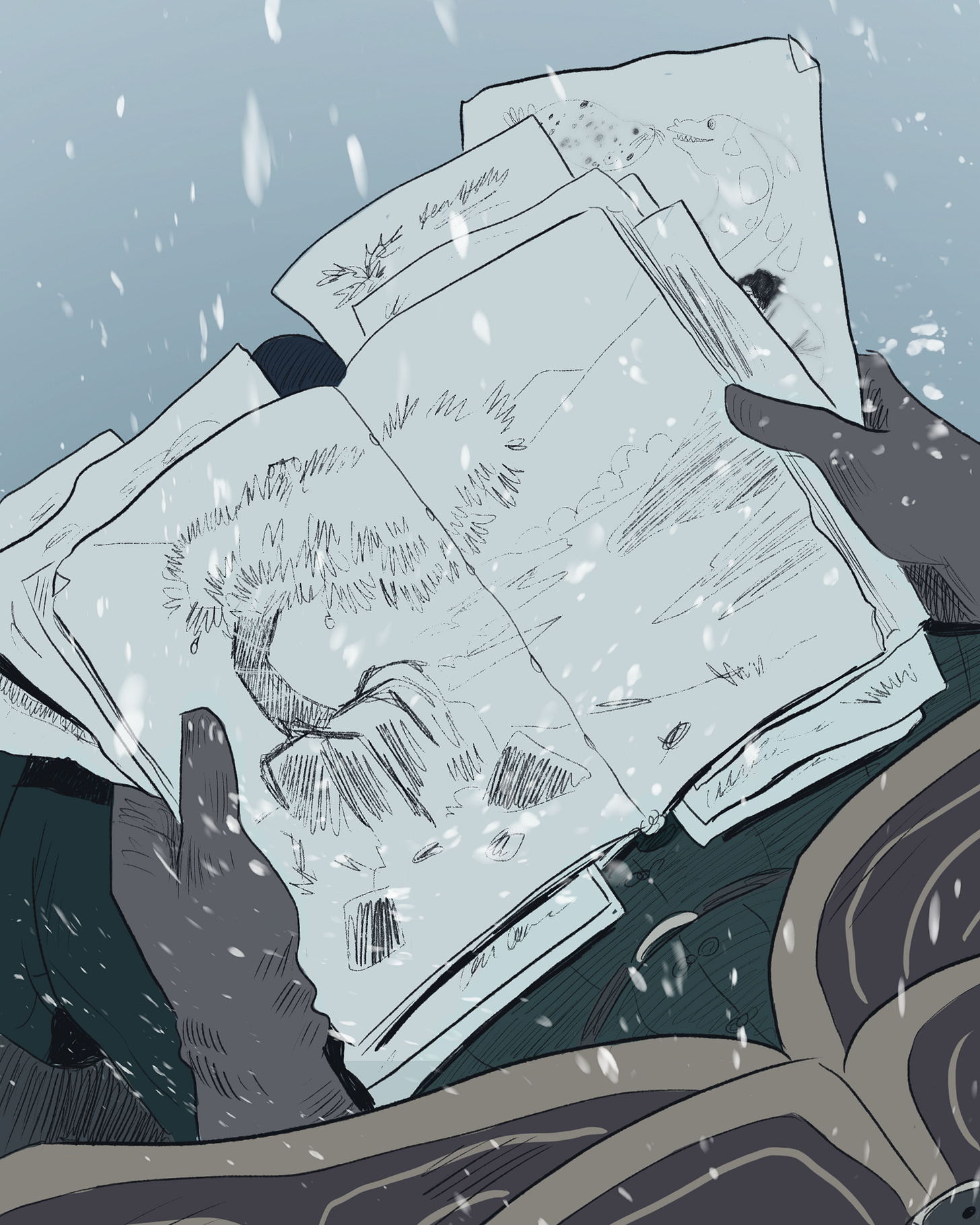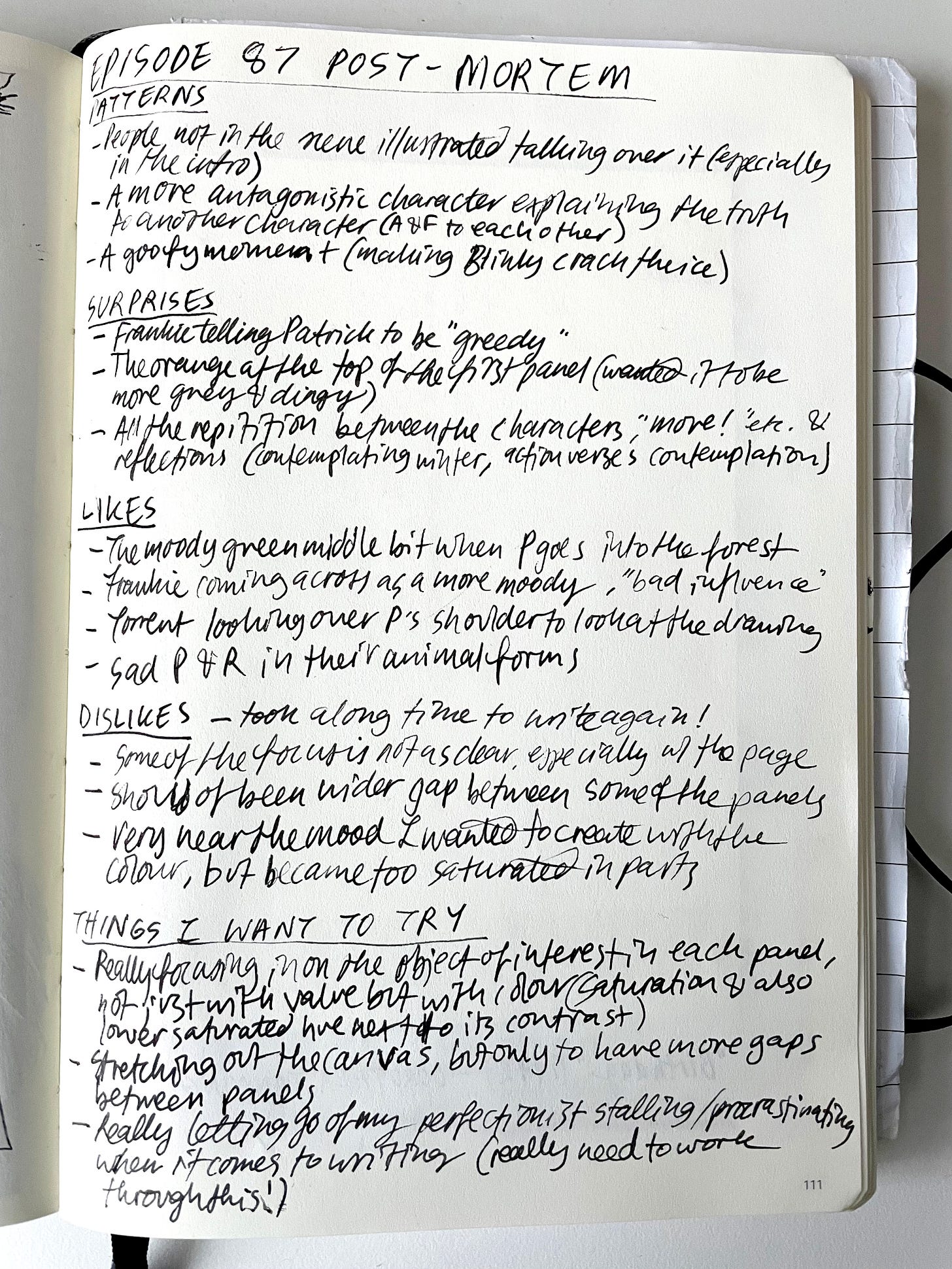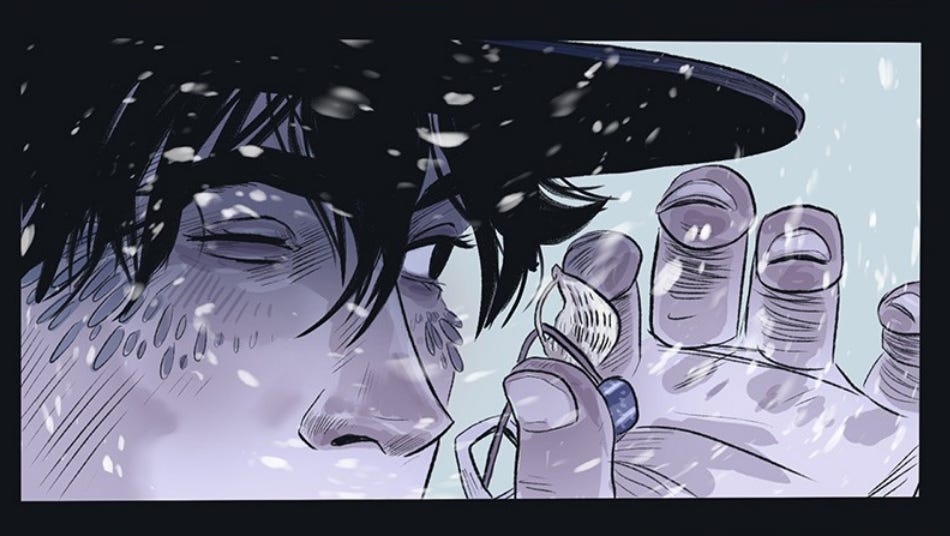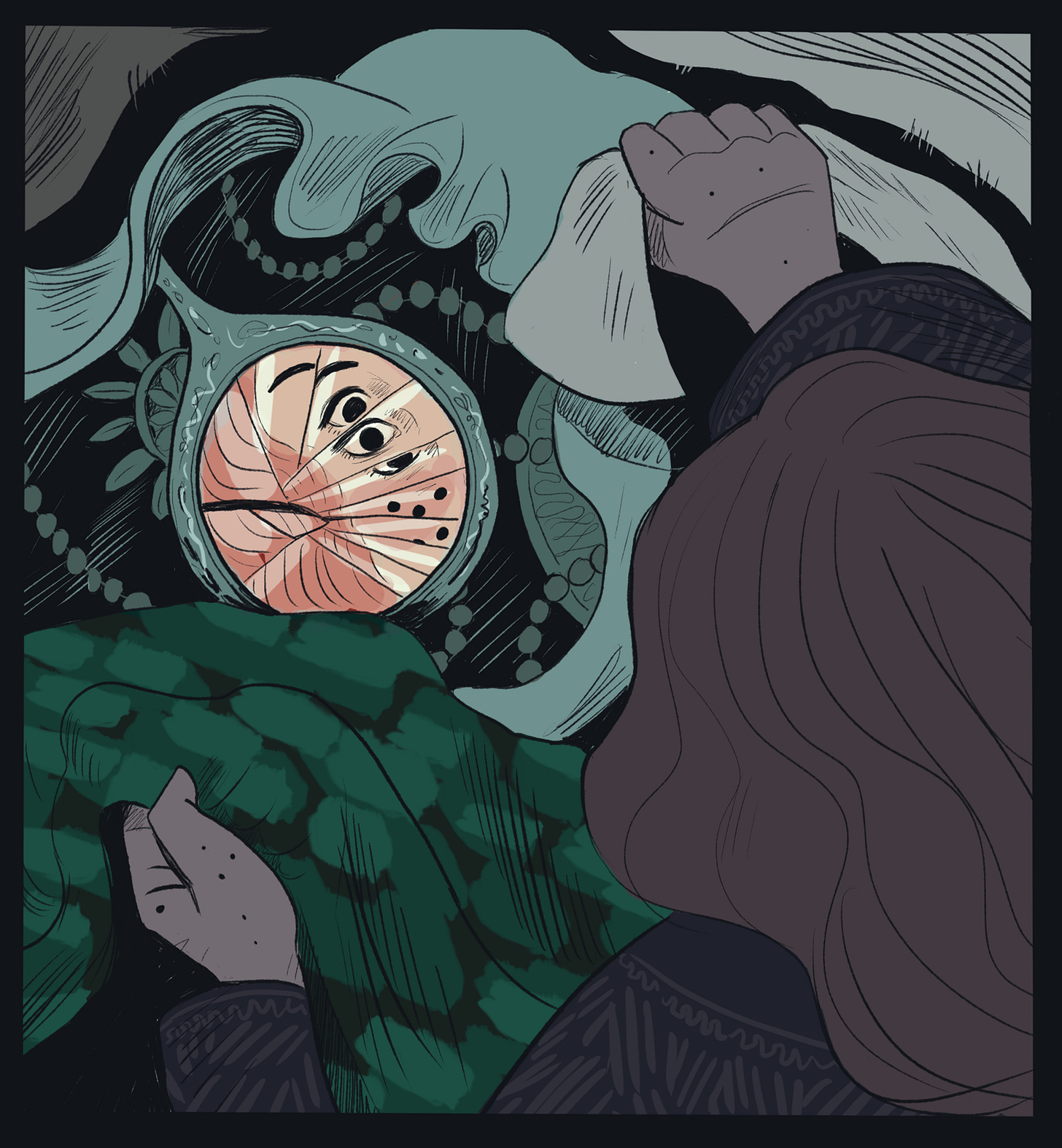Perfectionism and Procrastination
I'll huff and I'll puff and I'll blow your house down!
This letter refers to the process of writing my comic ill fame and specifically to episode 87, which you can read here.
There’s a practice I like to do after each episode is finished and after any illustration I make and that is perform it’s post mortem.
I stole this technique from Kathleen Jennings and one of her Observation Journal posts, Project review and the brightness of sky in water. It’s a simple idea that helps you slow down a little and take stock of what you’ve just achieved, while also allowing space to criticise your work and decide if there are things you would like to try differently next time. Allow me to indulge in my histrionics once more and say that this has been a revolutionary practice for me and has been the number one method for me to understand and improve my art.
I’d recommend reading Jennings article, but all you do is make a list of at least three items under each of these catagories: Patterns, Surprises, Likes, Dislikes, and Things I Want To Try.
Below is the post mortem for episode 87. I apologise for the scrappiness (I don’t normally share these with anyone). I tend to also intial the characters names (F=Frankie, R=Rhys, A=Albert and P=Patrick).
If you can read my writing, you might of noticed a complaint under the “Dislikes” header describing a reccuring issue of mine; “took a long time to write again!” And this really is something I complain about a lot; episode 84’s post mortem laments “the scripting was a nightmare, I really couldn’t get a handle of this episode - need to find a way to deal with this”; 85’s “took far too long to write, got really stuck on it which put me behind”; and episode 86, under things I disliked, “HOW FUCKING LONG IT TOOK TO WRITE”. That episode took three weeks to write and you can read more about that here. For context, I usually try not to spend more than a week drafting and writing an episode (and that week usually doubles as a rest week, too).
The creative post mortem is excellent at noticing and raising questions, but for me at least, it doesn’t always provide the answers. Yes I know I have an issue with my writing, but how exactly do I fix this?
~~~I am realising more and more that while I think I’ll have to search out answers like a sniffer dog, my lizard brain hopes even more that the correct answer will just appear in front of me if I am patient enough, that enlightenment will occur and I can relax. The third way is actually that I will be blown away by an Idiot Wind and what I believed to be an indisputable fact about myself was actually just a shoddy fascade ready to be huffed and puffed and blown all the way down~~~

One thing I did realise while writing episode 87 was that I was procrastinating hard. I know, I know. Everyone loves to blame procrastination for everything. But when you keep notes about your work process you do eventually notice the patterns. For me it was needing the perfect working conditions to write in. Quiet. Maybe some ambient music. But then I feel guilty for my hermit ways. And then the doubt about my existing story ideas kick in. What if I try some YouTube or Twitter-omancy? Maybe I’ll come across that one perfect tweet or video that’ll inspire me and solve all my writing woes.
This all reads ridiciously and it is ridiculous but this is the pattern I fell into.
I knew procrastination had something to do with perfectionism so perhaps that could do with some sniffing around. A podcast by Hidden Brain called “Escaping Perfectionism” featured an interview with psychologist Thomas Curran. Now, there is nuances to the term “perfectionism”, it is not all high standards job interview fodder. Perfectionism can be self-destructive more than anything, stemming from a fear of failure in a lot of cases. Below is a quote from the podcast that really stuck with me. It’s a bit long but I think it’s worth reading in full:
When things start to go wrong, perfections do something really, really interesting. They withhold their effort in order to save face, to kind of preserve their image and their sense of self. And we've done a lot of experiments looking at this phenomenon, and one of the most illuminating of those experiments is when a colleague of mine, Andrew Hill, took people into the lab, gave them a cycling task and said, you got to complete a certain distance in a certain amount of time, and based on your fitness, you should be able to do X amount of distance. So he got them going with the task, and everybody worked really hard to meet the goal. And at the end he told them, no matter how well they did, that you failed. Now what's really interesting here is that after telling people they failed, he asked them to do it again.
And that's where something remarkable happened because people who didn't have a great deal of perfectionism, on that second attempt after the first failure didn't really change the amount of effort they put in. If anything, it went up slightly. But the people who scored high in perfectionism did exactly the exact opposite. They withheld their effort on the second attempt because the thinking in their mind is, you can't fail at something you didn't try. And if I put all of myself into this first effort and still didn't make it, well, I'm not going to do that again because the feelings of shame and embarrassment was so intense that I just don't want to feel those things again.
And so this is the perfectionism paradox I suppose, this is that they really are so intensely fearful of that failure that when it looks like it's going to be a very likely outcome of anything that we're doing, then they take themselves away from those situations. That's incredibly self-sabotaging. It doesn't just look like complete withdrawal, by the way. It can also come in the form of procrastination. So we'll remove ourselves from doing activities that are really difficult in the moment because the anxiety is so intense. All of those things are not at all conducive to performance.
(Emphasis mine.)
I felt this in my bones. I recognised the pattern. I made some notes after I listened to that podcast back in January:
“It kind of reminds me of when I heard that nail-biting is self-destructive, self-harm; that nail-biting is conversely a way to make your nails look good… And it’s the same in my writing. I can start off well & hyped and then when it comes to revision, or just making it better, I know I’m going to pump out some bad ideas before the good ones, so I just sit and hope that I can wait out for the good ones instead. This can explain why I get to a point where I’m so frustrated & exhausted that I’ll just write something and it’ll be good enough.”
Yeah.
Yeah.
I started listening to Curran’s book The Perfection Trap while I was drawing episode 87. I won’t go into my life and history here, but I felt terribly seen by that book, let’s just put it like that. It really made me stop and look at how I get myself into these situations where I will just stall myself, or let stress bubble up inside of me. While I will certainly recommend this book to anyone that feels any connection with these issues, a quick bit of advice from Curran is to notice when you fall into these perfectionism traps. Feel the Idiot Wind howl over your senses. The Big Bad Wolf of potential failure threatening to blow your house down. Recognise when these compulsions come up and have some compassion for yourself. One of the most refreshing things about Curran’s book is his recognition that a lot of this is systemic within society, so we need to have compassion for ourselves and others where politics will not.
Spoilers for the next episode of ill fame, but this approach has been very helpful.
You can read episode 87 of ill fame, which includes mushroom gnomes stealing drawings and our lads tricking a giant many-eyed boar onto thick ice, here.
Episode 88 of ill fame includes not one but two spells by our princess-witch and will be released on 11th March 7pm gmt. Below is a little preview.
P.S.
I know nobody wants another Hades and Persephone retelling but I can’t get this line from Book 20 of Emily Wilson’s translation of The Iliad out of my head:
“Beneath the ground, the king of spirits, Hades, was terrified, jumped from his throne, and shouted to Poseidon, god of earthquakes, not to allow the ground above to break and show to mortals and the deathless gods his horrifying kingdom of decay, which is disgusting even to the gods.”
I can’t get the image of a disgusting, decay-filled underworld and a grubby Hades out of my vision. My own putrid version of Persephone’s story may never exist but I’m allowing myself to think about it.







